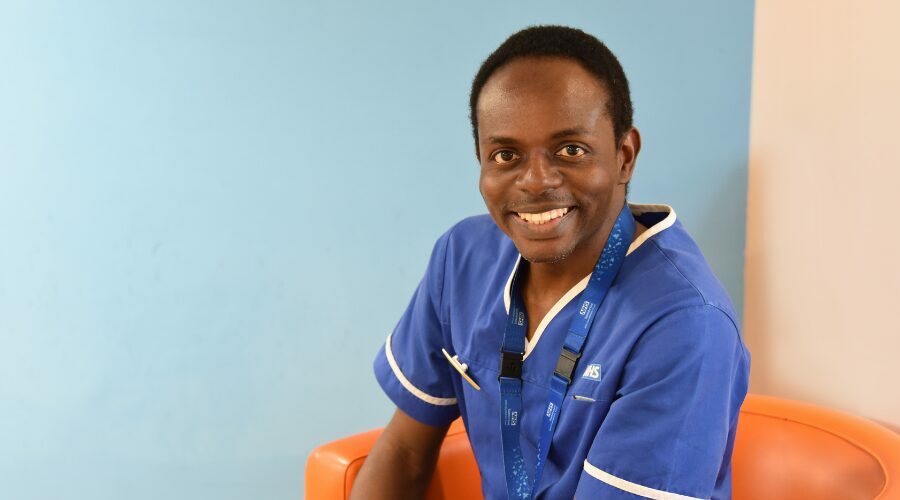
Spotlight
Nurse Femi explores the effect of language barriers in stroke care
Clear and good communication between doctors, nurses, and other healthcare professionals and their patients is so important in ensuring a better outcome.
Sometimes, though, language barriers can get in the way, and this can be even more challenging for patients in need of neurological care, such as after they’ve experienced a stroke.
This is something that Oluwafemi Alo (or Femi as he’s known as), a staff nurse who works on the stroke rehabilitation unit at Williton Community Hospital, has come across on a number of occasions during his time with the trust.
When the Chief Nurse Research Fellowship came up last year, Femi thought it was a great opportunity to do something about it.
“My project is all about understanding the challenges that nurses face with patients who don’t have English as their first language, or those who don’t speak English altogether,” he says.
“As I work on the stroke unit, I chose to focus my project specifically on those who have experienced a stroke, looking at the difficulties they have in understanding and communicating with others.
“We know that people who’ve had a stroke have lots of physical issues, and this tends to lead to emotional issues too, so I wanted to explore this in greater depth.”
It was a personal experience with a patient that Femi had on the ward that first prompted him to look at this subject.
“One of the patients I cared for on the stroke unit was from South East Asia and couldn’t speak any English,” he explains.
“Although he could say ‘yes’ and no’, he wasn’t really able to understand or answer any of the questions me and my colleagues asked, and to be honest I really felt his frustration.
“At one point he wanted to tell us that the seat was uncomfortable for him, but he was just saying “dizzy, dizzy” all the time.
“We felt that he was experiencing hypertension (high blood pressure), so we checked him over and tried to get him back to his bed space, but he was still very angry and frustrated.
“I had to get closer to help navigate his needs, so I pointed to the chair and tried to put a pillow it, to which he said, “yes yes yes”, so I understood that, but it was really frustrating and challenging to both our colleagues and the patient himself.
“Overall, the patient was well cared for and safe, but I identified that this was a gap in the way we look after our patients, especially with England and the NHS becoming increasingly multicultural and diverse.
“Following this, I realised that it was a scenario that we’re only going to continue to see, so I feel that we need to be more proactive and put things in place…and I’m hoping that the findings of my project will help to do that.”
As part of his project, Femi contacted some of the nurses on our community hospital stroke rehabilitation units at South Petherton and Williton, as well the Dunkery Stroke and Neurological Unit at Musgrove Park Hospital.
“My interviews with them were semi-structured, where I came with a list of questions that I didn’t restrict myself to, which helped to widen the conversation,” he continues.
“I was able to examine the opinions and experience of those colleagues and develop a recommendation for what the trust might be able to put in place.
“Colleagues at our knowledge and library service were really helpful in finding me useful resources that could help with the evidence and literature review behind my project too.
“It was the first time I’d ever got to analyse and process research data and I found that really challenging, but it was a really exciting opportunity for me, especially as it showed a great set of results.
“The results of my project indicated that there are some real gaps we need to cover in meeting the needs of these categories of patients.
“One of the areas of improvement that my project showed as needed was in our interpretation service, as our regular service is not always available.
“It may be that we could look to design some type of AI technology that could enable instant interpretation of our clinical words and terminologies, rather than needing to wait for people who can help with medical interpretation.
“Colleagues told me that they were particularly concerned about the privacy and confidentiality of their conversation when using internet-based translation apps like Google translator.
“This experience was a real eye opener for me and has given me the confidence to discover my ability in the research environment.
“I now want to look at what further studies I might be able to complete in my area of interest – the use of technology in stroke care – and I’ve found great support and inspiration from the Chief Nurse Research Fellowship.”

